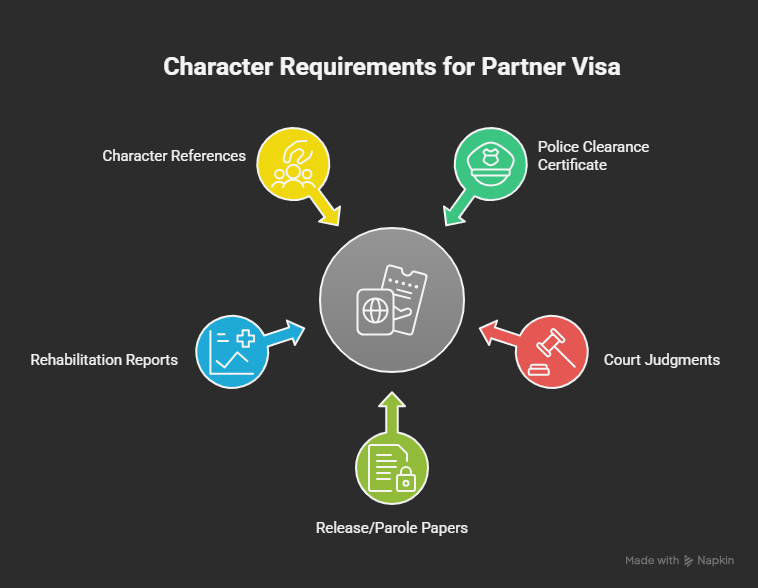When applying for an Australian Partner visa, it’s not just your relationship that’s assessed, your health and character matter too. These checks help the Department of Home Affairs ensure applicants meet Australia’s public health and safety standards.
In this guide, we’ll explain the medical and character requirements for a Partner visa, including what to expect from health examinations, police checks, and how to prepare supporting evidence. You’ll learn how medical conditions are assessed, what needs to be disclosed, and how being honest and organised can make the process smoother and boost your chances of approval. Let’s dive in and learn about medical and character requirements for Australian Partner Visas!
Key Takeaways:
- Health and character checks are designed to protect Australia’s safety, not to single out applicants.
- Many common health conditions do not stop Partner visa approval.
- Pre-existing conditions are often managed with clear medical reports and treatment plans.
- Past criminal history does not automatically bar you. Assessors look at severity, timing and context.
- Full disclosure is crucial — hiding facts causes bigger problems later.
- Obtain police checks from every country where you lived for 12 months or more.
- Early preparation and expert help, including our Department experience, improve your chance of success.
Meeting the medical and character requirements for a Partner Visa can feel daunting — but with the right guidance, it doesn’t have to be. At Sellanes Clark Immigration Law Specialists, we help couples prepare complete, compliant applications that meet every government standard. Visit our website to learn how we can simplify the process for you.

Understanding Health Requirements
Your medical checks look at whether you pose a public health risk or will need unusually high health or community care. These checks include a physical exam, chest x-ray and blood tests. Results go to the Department and help assess treatment needs and likely cost to the health system.
Many applicants worry this is invasive. I’ve seen this anxiety before, and it often eases with clear preparation. If you gather recent records and explain treatment plans, assessors can make a fair, informed decision.
What Health Assessments Involve
You will see a panel physician approved by the Department. Expect a medical history, basic physical exam, chest x‑ray for tuberculosis screening and blood tests for HIV, syphilis and hepatitis. The clinic will send results directly to the Department, not to you.
Additional tests or specialist reports may be requested if you have ongoing conditions. Under the Migration Act, health requirements assess both public health risk and potential cost to the community. Typical medical exam costs range from about AUD 300 to 600, and results usually take a few days to a few weeks.
Common Health Conditions and Outcomes
Many common conditions do not stop visa approval. Asthma, well‑managed diabetes and treated depression are often accepted when you provide recent tests and a treatment plan. For example, I recently helped a client with controlled diabetes by submitting an HbA1c test from the last three months and a GP letter, and the visa was granted without extra conditions.
Certain situations attract closer scrutiny. Ongoing dialysis, frequent hospital admissions, or very high ongoing treatment costs are examined for their likely impact on public health services. If you have HIV, an undetectable viral load and stable treatment usually lead to a positive outcome when documented properly.
If an adverse health finding appears, you can submit more evidence or specialist reports and we can seek a review. Early disclosure and clear medical documentation reduces delay and improves the chance of a favourable decision.
The Character Requirement Explained
The character requirement checks whether you pose a risk to the Australian community. Assessors look at criminal records, past behaviour, and any associations that suggest you might harm others or the public interest. You must provide police certificates from every country you lived in for 12 months or more.
If you have offences, the decision depends on seriousness, timing, and pattern. I’ve helped many couples where past minor mistakes did not stop their visa, because we gave full documents and clear explanations. Being open early makes the process smoother.
Why Character Matters
You need to show you are of good character so your partner and the community are protected. Officials consider violent acts, sexual offences, repeated dishonesty, and links to organised crime. They also look at whether behaviour shows a pattern that might continue.
In practice, a single old minor offence will usually have less impact than recent, repeated, or serious crimes. You should expect questions about the nature of the offence, any sentence, and what you have done since then to rehabilitate yourself.
Types of Offenses and Their Impact
Offences fall into clear groups: minor fines and traffic offences, short-term imprisonment, serious violent or sexual crimes, drug trafficking, and fraud or large-scale dishonesty. Sentences and the number of offences matter a lot. A sentence of 12 months or more is often treated as a substantial record and increases refusal risk.
Recency and pattern also matter. Multiple convictions over a short period show a pattern. An isolated offence from many years ago with strong evidence of rehabilitation may be dealt with more leniently. Under the Migration Act, assessors weigh these factors together.
- Minor offences (fines, no jail) often have low impact if isolated.
- Short sentences (less than 12 months) raise questions but can be managed with documents.
- Serious offences (violent, sexual) carry high refusal risk and need strong mitigation.
- Drug trafficking and organised crime links usually lead to refusal unless there is exceptional evidence of rehabilitation.
- Assume that full disclosure and strong supporting evidence improve your chance of a positive outcome.
| Offence type | Typical visa impact |
| Fines / traffic offences | Low impact if isolated and old |
| Short imprisonment (<12 months) | Moderate concern; needs explanation |
| Imprisonment (≥12 months) | High risk of refusal without strong evidence |
| Sexual or violent offences | Very high risk; must provide rehabilitation proof |
| Drug trafficking / organised crime | Usually leads to refusal unless exceptional case |
Preparing Evidence For Offences
When you prepare evidence, focus on clear documents including court records, sentences, release dates, certificates of conduct, letters from employers, and rehabilitation reports. I often obtain character references, counselling records, or proof of community work to show genuine change. The more detail you give, the better assessors can judge whether you are a continuing risk.
- Provide certified court documents for every conviction.
- Include release dates and details of sentence served.
- Attach rehabilitation records, counselling, or treatment certificates.
- Supply at least two personal or professional character references dated and signed.
- Assume that documentation from the country where the offence occurred matters as much as Australian records.
| Document | Why it helps |
| Police clearance certificate | Shows official criminal history and dates |
| Court judgments | Proves the exact offence and sentence |
| Release / parole papers | Shows when sentence ended and supervision details |
| Rehabilitation reports | Demonstrates treatment and behaviour change |
| Character references | Offers personal testimony about your conduct now |

Pre-existing Medical Conditions
Pre-existing conditions are common among Partner visa applicants and, in my experience, most do not stop a grant on their own. You should treat them as a paperwork and explanation task. For example, I helped a client with Type 1 diabetes who had used insulin for 10 years. We supplied 24 months of clinic notes, the last three HbA1c results, a specialist letter outlining stable control, and a clear treatment plan. That file gave the assessing doctor what they needed and the visa proceeded without extra cost concerns.
Some conditions may trigger extra assessments or cost queries. Conditions that require ongoing high-cost care or long hospital stays are more likely to prompt questions about future treatment costs and services in Australia. You will often be asked for a specialist’s prognosis, itemised treatment cost estimates, and evidence of how care will be financed in Australia. Early preparation of those documents reduces delay and gives you the best chance of a straightforward outcome.
Managing Documentation
Gather a concise medical pack before you lodge. Include a GP summary, specialist letters, medication list with doses, hospital discharge summaries, imaging reports and test results for the last 12 months. If tests are older than three months, update them. Provide certified English translations for any non‑English records. I advise including contact details for the treating clinicians so an assessor can follow up if needed.
Organise the file with a one‑page index and a simple timeline of events and treatments. Label each document with dates and author names. Keep electronic PDFs and back up originals. When I manage cases, I also prepare a one‑page clinical summary that highlights stability, current needs, and likely future care. This helps busy assessors find the key facts quickly.
Sharing Your Health History
Be open about your full health history. Hiding past hospital admissions, self‑harm incidents or treatment for substance dependence creates more problems than it avoids. I have worked on cases where late disclosure led to extra assessments and long delays. You will be asked directly about past and current treatment, diagnoses, and any hospital stays, so answer honestly and provide supporting records.
When you explain sensitive issues, frame them with facts and evidence. Ask your treating doctor for a clear letter that states diagnosis, current status, treatment adherence, and expected care needs. Include recent test results, medication history, and a short note about how you will access care in Australia, such as a treating specialist or private health insurance. This practical detail helps assessors see the real picture and often reduces concerns.
Even a small oversight in your health or police clearances can delay or derail your Partner Visa. With more than 20 years of experience inside Australia’s immigration system, Carlos Sellanes and his team know exactly what case officers look for. Discover how we can help you get it right the first time — visit our website today.
Past Criminal Records
Your past criminal record will be looked at closely, but it does not automatically end your application. Assessors focus on what you did, how serious it was, how long ago it happened, and whether you are likely to offend again. Small fines or old minor offences are treated very differently from recent violent or serious offences.
You must disclose every relevant conviction and provide police checks from every country you lived in for 12 months or more. Hiding a record or giving incomplete information usually leads to refusal. I have seen many cases where honest disclosure plus good evidence of rehabilitation changed the outcome for the better.
What Counts as a Disqualifier
Offences that usually lead to refusal include those carrying imprisonment of 12 months or more, sexual offences, serious violent crimes, trafficking or large-scale drug offending, and crimes against children. A single sentence of 12 months in prison, or an aggregate sentence totalling 12 months, is treated very seriously by the character test.
Other disqualifying facts include recent offending, outstanding warrants, past deportation from Australia, and membership of organised crime groups. Under the Migration Act, the character test lets the department refuse visas where a person poses an unacceptable risk because of their criminal history.
Circumstances That May Aid Approval
Factors that help your case include low gravity of the offence, time passed since the offence, completion of your sentence, and clear evidence of rehabilitation. Stable work, steady residence, strong family ties in Australia, and positive references from employers or community leaders also weigh in your favour. Simple traffic offences or a single minor theft many years ago are often viewed sympathetically.
For example, I helped a client with a ten-year-old non-violent conviction and a short, suspended sentence. They completed a rehabilitation program, kept steady employment for six years, and provided employer and probation reports. The visa was granted because the evidence showed low risk and genuine change.
When you prepare your case, include court records, sentencing remarks, proof of completion of programs, police clearance certificates, employment records, and character references. A clear timeline and a personal statement explaining steps you took to change are very helpful. I often work with clients to compile this exact package so assessors can see the full picture.

The Importance of Full Disclosure
Honesty in Applications
You must list all past convictions, charges, and health issues, even if they seem minor or old. Police clearances are required from every country where you’ve lived for 12 months or more, so omissions often surface later. I have handled hundreds of partner visa files and seen small omissions become major problems when checks turn up unexpected records.
Be specific about ongoing treatment, medication, or mental health care. For health, that often means chest x-rays, blood tests, and a clinician’s letter explaining management and prognosis. Under the Migration Act, health assessments consider whether you pose a public health risk or significant cost to Australia, so you should give clear, current evidence rather than hope an assessor will assume the best.
Consequences of Non-Disclosure
When you hide information, the most common result is a refusal because your character or health claims cannot be trusted. The department views non-disclosure as a credibility issue. In one case I managed, a client failed to report a 2015 conviction and the visa was refused; that omission added more than a year to the process and required fresh police checks and legal submissions to fix.
Non-disclosure can also lead to visa cancellation if the department later discovers the omission after grant. That can mean deportation or being barred from returning for a period, depending on the seriousness. Criminal penalties are rare but possible where dishonesty amounts to fraud, and even honest applicants who omit facts by mistake face lengthy, stressful reviews.
If you’ve already missed something, tell your agent or lawyer straight away and gather supporting documents: police certificates, medical reports, court outcomes, and character references. Early disclosure lets us prepare explanations and mitigation, which often turns a potentially fatal problem into a manageable one.
Seeking Professional Guidance
When to Consult an Expert
Consult an expert as soon as you suspect a health or character issue might affect your visa. If you have a chronic condition like dialysis, cancer treatment, hepatitis B, or a mental health diagnosis that needs ongoing care, get advice early. Also seek help if you have any criminal history, even minor offences, or if you lived in multiple countries and need several police checks.
Under the Migration Act, health requirements assess likely cost and community risk. Bring medical records, hospital discharge summaries, medication lists, and police certificates to your first meeting. I once helped a client with Type 1 diabetes and a past assault charge by compiling five years of GP notes and a rehabilitation affidavit; their partner visa was granted after a focused, evidence‑based submission.
How We Can Help
We review your whole file and identify risks you might not see. Our team arranges targeted medicals and commissions expert reports that explain prognosis and likely costs. We’ve managed hundreds of complex health and character cases since 2003, so we know what assessors look for and how to structure evidence clearly.
Our team prepares honest, organised submissions that include treatment plans, cost estimates, and rehabilitation reports when needed. We also liaise with panel physicians, obtain specialist letters, and draft clear statements from you and your sponsor. This upfront completeness often reduces delays and avoids follow‑up requests.
More specifically, we perform a detailed file audit, identify what medical or police documents are missing, commission concise expert opinions, draft plain‑language submissions that address the department’s concerns, and follow up with case officers until a decision is made. You remain informed at every step and we support you through sensitive disclosures.
Final Words
Presently you will need to satisfy both medical and character checks to succeed with a Partner visa. These checks look at your health risks and any past conduct. Be honest about conditions and past issues. I’ve guided many clients to approval despite worries.
Act early. Arrange your health exams and police certificates from every country you lived in for 12 months or more. Provide clear medical evidence and full explanations. Seek professional advice if your case is complex. With openness and good preparation, you can give yourself the best chances of success.
Your Partner Visa journey is too important to leave to chance. Since 2003, Sellanes Clark Immigration Law Specialists has helped couples across Australia and overseas meet medical and character requirements with confidence. To ensure your application is strong and compliant from the start, visit our website now.
FAQ
Q: What medical checks do partners need?
A: You must see an approved panel doctor for exams, x-rays, and blood tests. I advise attending to this early so issues can be documented. Most common conditions do not stop a partner visa when treated and shown in records.
Q: Will a pre-existing medical condition stop my visa?
A: A pre-existing condition rarely means automatic refusal. With clear medical reports and treatment plans, many applicants pass. Serious, costly conditions may need extra evidence or specialist advice.
Q: How does mental health affect my application?
A: Mental health is assessed like any health matter. Ensure full disclosure and clinical reports showing stability and treatment. If risks are low and support is in place, mental illness alone often will not block a partner visa.
Q: What character checks are required?
A: Applicants must provide police certificates from countries where they lived for 12 months or more. Good explanation and supporting documents can soften past minor offences during the assessment.
Q: Will past convictions stop my visa?
A: Not always. The Department will review the facts, sentence length, and time since the offence. Serious, recent sentences are most concerning. Honest disclosure, court records, and rehabilitation evidence often lead to a balanced decision in the applicant’s favour.
Q: What is the Significant Cost Threshold and how does it affect me?
A: The Significant Cost Threshold looks at future health care costs to Australia. The Department assesses whether treatment will exceed the threshold. If it does, additional information or a waiver may be required and specialist reports help your case.
Q: What happens if I fail to disclose health or character issues?
A: Failure to disclose can lead to refusal, visa cancellation, or legal penalties. I always advise full honesty and early disclosure. If omissions are found, provide explanations and supporting documents quickly to reduce harm and show good faith.
Author Bio
Carlos Sellanes is the founder and principal of Sellanes Clark Immigration Law Specialists, an Australian firm established in 2003. Before launching the practice, Carlos spent more than two decades with Australia’s Department of Immigration, gaining unmatched insight into migration law and policy. Today, he leads a team recognised among the Top Ten Immigration Law Firms in the Asia-Pacific, offering expertise across skilled, family, and corporate visa categories. Through his blogs, Carlos shares practical updates and professional guidance to help clients navigate the complexities of Australian immigration with confidence. Learn more about Sellanes Clark Immigration Law Specialists.




